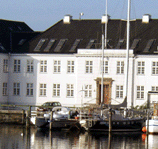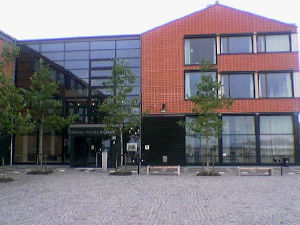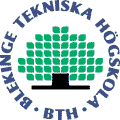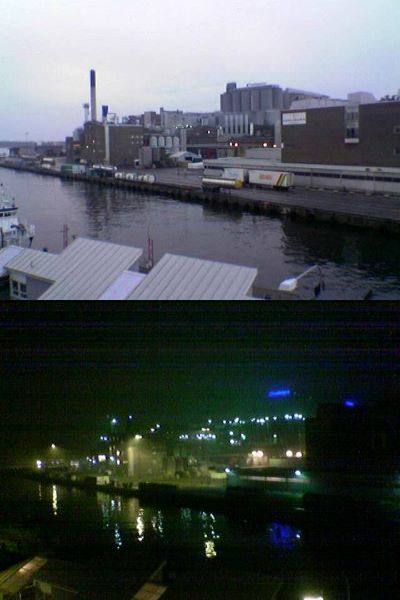Game Design Workshop at the Interactive Media & Marketing Academy
Nakskov, Denmark
 Yet another town reviving its economic fortunes through new technology. Nakskov was once the home of a thriving shipbuilding industry. The harbor is still there, but the great docks and other gear are used. The workshops, though, are building new wind-power turbines. There's a growing emphasis all over Europe on expanding their sources of renewable energy, especially wind power. The former offices of the shipbuilding company are now occupied by the Interactive Media and Marketing Academy, which invited me to come and give a game design workshop. We had about 25 students.
Yet another town reviving its economic fortunes through new technology. Nakskov was once the home of a thriving shipbuilding industry. The harbor is still there, but the great docks and other gear are used. The workshops, though, are building new wind-power turbines. There's a growing emphasis all over Europe on expanding their sources of renewable energy, especially wind power. The former offices of the shipbuilding company are now occupied by the Interactive Media and Marketing Academy, which invited me to come and give a game design workshop. We had about 25 students.
I've spent a lot of time in Sweden, but only a little in Denmark. One of the things I've noticed is that it's much harder to figure out how the Danish language is pronounced from the way that it's spelled, and the Danes tend to speak with a rapid, mushy delivery that's difficult to follow even if you already know what they're saying. Apparently the various Scandinavians can read each others' languages with some effort, but have a very hard time trying to understand each other.
 This was a very brief visit, so I didn't get to be a tourist at all, apart from having a couple of excellent meals with my host, Pierre Calundann, and some of the students. My trip was sponsored by Danske Bank, and I'm grateful for their support.
This was a very brief visit, so I didn't get to be a tourist at all, apart from having a couple of excellent meals with my host, Pierre Calundann, and some of the students. My trip was sponsored by Danske Bank, and I'm grateful for their support.
 Yet another town reviving its economic fortunes through new technology. Nakskov was once the home of a thriving shipbuilding industry. The harbor is still there, but the great docks and other gear are used. The workshops, though, are building new wind-power turbines. There's a growing emphasis all over Europe on expanding their sources of renewable energy, especially wind power. The former offices of the shipbuilding company are now occupied by the Interactive Media and Marketing Academy, which invited me to come and give a game design workshop. We had about 25 students.
Yet another town reviving its economic fortunes through new technology. Nakskov was once the home of a thriving shipbuilding industry. The harbor is still there, but the great docks and other gear are used. The workshops, though, are building new wind-power turbines. There's a growing emphasis all over Europe on expanding their sources of renewable energy, especially wind power. The former offices of the shipbuilding company are now occupied by the Interactive Media and Marketing Academy, which invited me to come and give a game design workshop. We had about 25 students.I've spent a lot of time in Sweden, but only a little in Denmark. One of the things I've noticed is that it's much harder to figure out how the Danish language is pronounced from the way that it's spelled, and the Danes tend to speak with a rapid, mushy delivery that's difficult to follow even if you already know what they're saying. Apparently the various Scandinavians can read each others' languages with some effort, but have a very hard time trying to understand each other.
 This was a very brief visit, so I didn't get to be a tourist at all, apart from having a couple of excellent meals with my host, Pierre Calundann, and some of the students. My trip was sponsored by Danske Bank, and I'm grateful for their support.
This was a very brief visit, so I didn't get to be a tourist at all, apart from having a couple of excellent meals with my host, Pierre Calundann, and some of the students. My trip was sponsored by Danske Bank, and I'm grateful for their support.

 I took a couple of days to go back to Karlshamn, on the south coast of Sweden, to teach about game design. I gave a lecture to a group of students, and also sat on a panel to talk about games to an extremely diverse group of people who were on a special course. I met a city planner, a professor of rhetoric, and a business development officer for a local district in Sweden -- who turned out to be a Lebanese Maronite Christian by birth. There was also a German filmmaker from the Frisian islands: tiny outcrops in the North Sea where they speak a dialect of German comprehensible only to themselves. We had some fascinating conversations over dinner and a few games of Battlefield 1942, which most of them had never seen before. We also enjoyed a wine-tasting competition, trying to identify four different Chiantis at varying levels of quality by their taste alone. I fared badly, I'm afraid, only correctly identifying two of the four. I assumed that the one with the harshest taste would also be the cheapest; as it happened, the cheapest was the one with the blandest taste.
I took a couple of days to go back to Karlshamn, on the south coast of Sweden, to teach about game design. I gave a lecture to a group of students, and also sat on a panel to talk about games to an extremely diverse group of people who were on a special course. I met a city planner, a professor of rhetoric, and a business development officer for a local district in Sweden -- who turned out to be a Lebanese Maronite Christian by birth. There was also a German filmmaker from the Frisian islands: tiny outcrops in the North Sea where they speak a dialect of German comprehensible only to themselves. We had some fascinating conversations over dinner and a few games of Battlefield 1942, which most of them had never seen before. We also enjoyed a wine-tasting competition, trying to identify four different Chiantis at varying levels of quality by their taste alone. I fared badly, I'm afraid, only correctly identifying two of the four. I assumed that the one with the harshest taste would also be the cheapest; as it happened, the cheapest was the one with the blandest taste. I was able to get a few pictures as well, one of the school's new building, and a couple of the big brewery there both by day and by night. The brewery was drying its barley, and the aroma of toasting cereal grains -- a warm, agricultural scent -- pervaded the waterfront. The pictures were taken out my hotel room window, and they nicely show how the harbor comes right into the middle of town. But this is just a small inlet from a much larger road that leads out to the Baltic. At the mouth there's an island fortified in Renaissance times to protect the town, and one of these days I'd like to go have a look at the fortifications... if I ever get there in the summertime.
I was able to get a few pictures as well, one of the school's new building, and a couple of the big brewery there both by day and by night. The brewery was drying its barley, and the aroma of toasting cereal grains -- a warm, agricultural scent -- pervaded the waterfront. The pictures were taken out my hotel room window, and they nicely show how the harbor comes right into the middle of town. But this is just a small inlet from a much larger road that leads out to the Baltic. At the mouth there's an island fortified in Renaissance times to protect the town, and one of these days I'd like to go have a look at the fortifications... if I ever get there in the summertime.

